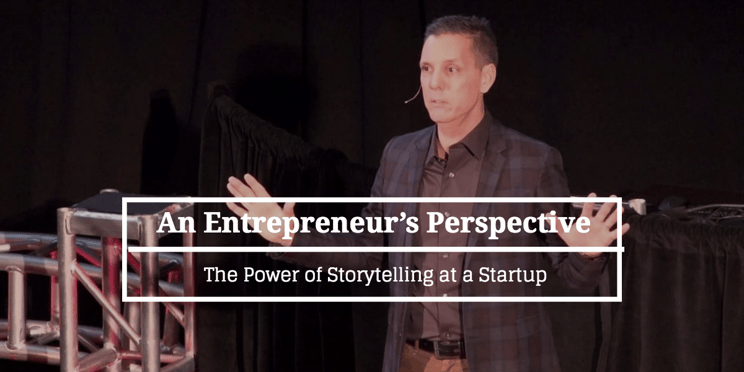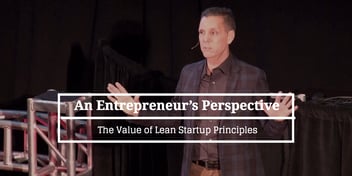
Long before we had developers, data scientists, and UX designers – we had storytellers. Every day, our human experience is shaped by the narratives found in what we read, watch and hear. We know intuitively and by experience that a good story can make or break an investor pitch, a partnership meeting, or a conversation with a customer.
So why is it that so often entrepreneurs offer up significant resistance to investing time and resources in developing a unique, compelling and well-crafted story for their tech startup company and their product?
The Entrepreneur’s Storytelling Dilemma
My perspectives on the value of storytelling are informed by both my personal experiences with 3 startups, and my observations of other technology and business builders. As entrepreneurs, we all need to face some of our communications shortcomings that can end up being big roadblocks to the success of our companies.
-
Our entrepreneurial brain can be so emotionally and intellectually invested in our technology that we think: “Everybody should immediately understand and love this. It’s a work of art obviously leading to a big opportunity.” When we don't get that reaction, we too often feel it is the fault of “the audience” and not ourselves.
-
For those who have never developed storytelling as a core business skill, the blinders may be put firmly in place to focus only on the comfort zone of code and user interface. However, the difficulties that we choose to ignore may end up being our undoing.
-
With a common predisposition to undervaluing and being uncomfortable with storytelling, it is often approached late in the game as an afterthought. The problem here is that leaves the door open for the market or your competition to define your story first, and not to your benefit.
-
Even though we hire and bring in experts with skills in coding and business development to work alongside us, we are too often reticent to do the same with those who know how to help us craft a fine story. I will argue that the time and dollars spent on this are just as important as that allocated to programmers.
The MVP Needs the MVS – The Minimum Viable Story
If you are truly innovating – providing something completely new – then people require a framework to begin to understand what you are offering. You can’t rely simply on your technology and product to generate interest or attention from others. You need something beyond a features list to convey the “what and why.”
This is where the MVS, the minimum viable story, enters our conversation – with deep respect to Eric Ries and the lean startup’s MVP principles.
Your initial story, the MVS, is much like the MVP in that it will probably not be 100% right from the beginning. While the core of the story must be solid and reflect the truth of the company, you will need to be open to testing and iterating your story and language, just as you do for your product. This means interacting with real people, not just your friends and colleagues. And just like the MVP process, this iteration is in search of product-market fit, although we might call this message-audience fit.
Since technology alone by its nature doesn’t tell a story, how do we discover and develop the core of the MVS? Real world investigations and insights are what help us begin to paint a picture of our customer’s day, the problem they need solved, their emotional needs and deeply personal goals - whether they can specifically articulate them or not. Diving in further, we may also discover that what we are competing against is not other technology, but market inertia or human habits.
The Other Side of the Table – Investors, Customers and Partners
The entrepreneur is always telling their story to someone on “the other side of the table.” And the other side of the table always brings its own perspectives and biases. You need to understand what those are, but not allow them to define you. While the core of your story is always consistent, we know there is a need to emphasize and bring certain elements to the front to engage the attentions of different audiences.
-
Investors have probably already heard something very close to your story, or will at least think they have. And because of that, they may have already drawn some conclusions about you before you even begin. So how will your story get them to pause, listen and open up their minds?
-
Customers (B2B or B2C) may not even think they have a problem and hence aren’t looking for a solution. How are you going to tell them a story about making their life better in a way that matters personally to them? In the process can you get them to fall “in love” with you?
-
Strategic partners and potential collaborators need to know how what you are offering fits in their world, not how they just fit into yours. How will you tell a story of mutual benefit and success?
The Rewards of Great Storytelling
When an entrepreneur is open to the process of developing the story and gets it right, there are some significant rewards to be garnered for their startup. My experience in intentionally focusing on story development and implementation over a 90-day period in my current company has resulted in some significant gains in awareness, customers, and partnerships that previously evaded us.
-
Customer acquisition – New account signups increased 35X during the month of the launch.
-
Customer engagement – Organic customer growth increased as a result of our product users sharing and evangelizing our story inside their own company.
-
Partnership conversations – We are now sitting across the table from technology and brand partners who are having significant impacts on our business.
I know that a great story can make or break a company. And I also know that it is not easy. But if you don't invest the time and resources in collaborating on crafting this story, others will end up defining who you are, and not to your advantage. And then what happens to your innovative technology?





Leave a Comment